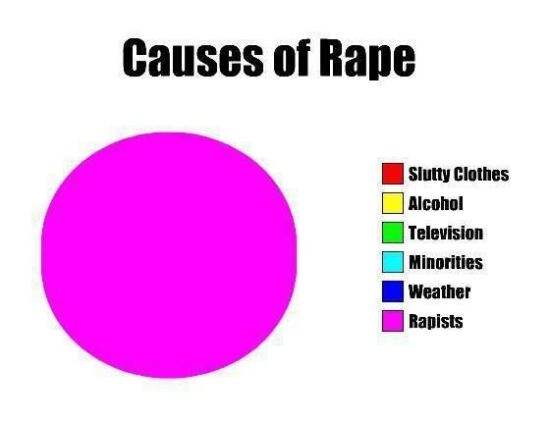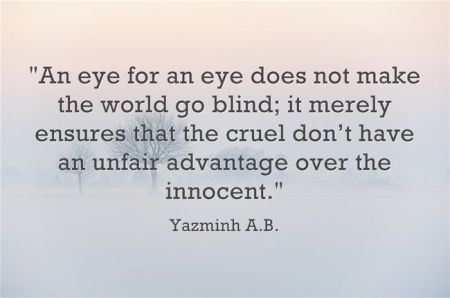(Photo Credit: Awottawa)
“My affair should NOT affect you!”
That was my former friend’s words of “conviction” (she was convinced in their validity, and I felt convicted by them) when we spoke recently. I confronted her about rumors that she was slandering me to squash inquiries on our +25-year friendship’s mysterious end. The meeting turned out to be the moot point I foresaw when I ended the relationship 6 months ago, with that statement perfectly representing why.
Such a statement sterilizes “facts” in a realm that is not sterile. It misleads the believer into self-righteousness as a way to dismiss accountability and feelings of guilt. Worse, it is brutal, burying any rights to emotions that the speaker/believer deems unacceptable, a right that they do not actually have.
For those who feel that their involvement in an affair is a private matter between themselves and their lovers, they are partially correct. Their spouses also have the right to know, but the nature of affairs, ironically, takes away this right. But if cheaters think that knowledge of their affairs should not affect those around them, they are sorely wrong. And if they think that witnesses who have survived one of their affairs are responsible for being unaffected for subsequent ones, they are delusional.
* * *
We were in our twenties when my former BFF had her first affair. I was alongside her as a good friend should be, supporting her emotionally, and without judgment, for the several years it took place.
Decades later, as she slipped into another one, I again took my dutiful place to help her through it. The first affair didn’t affect me. This one did, for both obvious and unexpected reasons:
– It was not her first time.
– We were no longer fresh out of undergrad.
– We were in our forties, with children, life experience, and firmer footing in our values and beliefs.
– I knew her husband 20 years longer than I did when she had her first affair – he was basically family.
This time, I felt a terrible guilt. I felt like an accomplice, because I knew better. And I knew that she knew better. This was a very painful place for me to be in.
If you cannot walk away from cheating on your spouse, and you have a friend that you trust to speak to about this, a few things to consider before you do:
CHEATER’S CONFIDANT CHECKLIST
1. Get to know your potential Confidant Friend. That is, take inventory of their values and life experiences, and know them in relation to your own. Regardless of what you both may be feeling at the moment, these factors can predict how your affair may affect them.
(DO NOT SKIP THIS STEP. Your dependable friend will most likely step up to whatever you ask of them; it is up to you to minimize damage from the get-go by gauging how much of your affair that they may be able to handle. Remember: They can not un-know anything.)
2. If you’re going to dish the dirt, be prepared to take the soap. If you trust this person with your affair, it must be because they’ve proven to be a true friend. Chances are, they are in this dismal place because they don’t want you to go through it alone; they truly care and want the best for you. Take their advice when they give it.
DO NOT TELL THEM ABOUT YOUR AFFAIR if you are going to continue to do the exact same thing for an indefinite length of time. They are human, also. They want to be there to help you, but if you are not taking any opportunities to get out of the affair, getting counseling to save your marriage, or taking steps to get separated or divorced (if you insist on continuing the affair), chances are, they will feel like an enabler and eventually disengage.
3. Be kind to your Confidant Friend. Maintaining your dark secret is a heavy burden on them. The stronger their moral code (see #1), the heavier this burden will be. They are going to get stressed over your affair, particularly if they are also close to your spouse and children. They will feel immense guilt for your spouse for sticking around and immense guilt for you if they walked away. They will suffer sleepless nights, loss of appetite, sudden crying and depression. Be prepared to find reserve of patience for your friend, who will have no one to turn to about their distress, and is most likely overturning their own principles to be there for you.
4. Do not, on any level, judge, dismiss, or otherwise be condescending towards your Confidant Friend. They are not judging you on your huge issue, and they take this life crisis seriously, so they may feel obliged to be there at your beck and call (and you will exercise this exhaustively). Meanwhile, they may also have to deal with their own life issues, and will feel unable to commiserate with you while you’re going through your crisis. They are essentially handling both the burden of your secret as well as their own burdens, alone.
If they have the courage to share something with you (and overcoming the guilt of asking from you takes a bit of courage for them), listen and offer support. If you cannot be there for them, let them know you are overwhelmed. Don’t be quick to change the subject and get back to talking about your affair with them or tell them all possible flaws in their hopes or dreams, should any come up. They have stretched themselves too thin for you to receive such little effort from you in return.
IF YOUR FRIENDSHIP ENDS, it is highly likely due to your affair, in which case–
1. Do not throw your ex-friend (and ex-confidant) under the bus to save your life. It can have quite the opposite effect. Your former friend and confidant may have had to walk away to salvage whatever is left of your relationship, and they may have had to end it in a way that may not be suitable to you. Remember, they stood by you through things that were highly unsuitable for them, and for an extended amount of time. You will never be put in a position to return the favor quid pro quo, so dig deep and offer compassion in its stead.
People will most likely be shocked that your friendship with this person ended so suddenly, and they will ask you why. You can be assured that it was, in great part, due to your affair, but you may give inquirers a benign, neutralizing reason, or simply say you don’t know, end of story. Do not perpetuate ugly rumors against your former friend to conveniently explain away the ending. If and when they find out, your ex-friend may understandably assume that you were diverting the affair (the one they endured for as long as they could out of love for you) at their expense. That is beyond betrayal, and grounds for open season on clarification by your ex-confidant; this is not the person to whom you want to do dirty.
2. Do not, under any circumstances, tell them that your affair should not affect them. This will add grievous insult to injury as described above.
FINAL CHEATER NOTES
Although the consequences can be very bad, having an affair does not make one a horrible person (depending on the circumstances). Good people make terrible mistakes sometimes. But one cannot involve another person into one’s own wayward path without getting them dirty. It is the cheater’s choice to get dirty; their confidant friend is merely alongside them in this unsavory journey as an act of love and sacrifice, to keep their lost friend safe while trying to lead them home.
If you bring a Confidant Friend along, be very, very kind. Unlike you, they are not getting any pleasure out of this journey to offset the grit. If they must exit the friendship, also be very kind – there is a good chance that they are already grieving.










